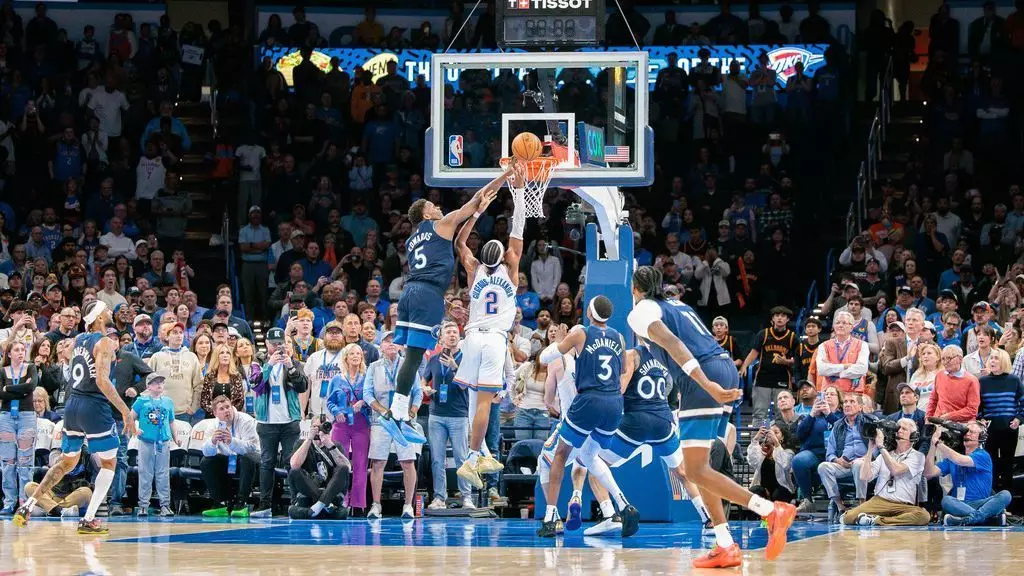In a thrilling contest that highlighted the unpredictability of the NBA, the Minnesota Timberwolves orchestrated an astonishing comeback to claim a 131-128 overtime victory over the Oklahoma City Thunder. This clash not only showcased the Timberwolves’ grit but also underscored the competitive nature of the Western Conference. After succumbing to a loss the previous night, the Timberwolves rallied to secure a statement win, demonstrating their resilience and depth in a high-stakes showdown.
Anthony Edwards was pivotal in reversing the Timberwolves’ fortunes after a tough loss. Although he faced challenges with a leg injury throughout the game, his impact was undeniable. Edwards finished the night tallying 17 points, 13 rebounds, and 8 assists. Significantly, he made the game-defining play by blocking Shai Gilgeous-Alexander’s attempt for a go-ahead basket in overtime, showcasing not just his scoring ability but also his defensive prowess. This moment encapsulated the Timberwolves’ effort as they battled back from a daunting 16-point deficit with only four minutes remaining in regulation.
The Timberwolves’ comeback was remarkable in that it came largely without their leading star on the floor during critical moments. Edwards was sidelined for much of the fourth quarter, raising questions about the team’s ability to perform under pressure without him. However, his teammates, notably Jaden McDaniels, stepped up. McDaniels led the scoring with 27 points and provided critical plays that fueled the Timberwolves’ resurgence during the final moments of the game.
While the Timberwolves finished strong, the Thunder’s inability to capitalize on their massive lead proved costly. Shai Gilgeous-Alexander, whose outstanding performance included 39 points, was instrumental for Oklahoma City but ultimately fell short in the clutch moments. His missed shot with just under three seconds left in overtime—what could have been a game-tying three-pointer—was emblematic of the Thunder’s struggle to maintain composure as the game slipped away.
The Thunder had built a sizable 82-57 lead in the third quarter, suggesting they were well on their way to victory. However, the momentum shifted dramatically in the fourth, as rookie Terrence Shannon Jr. played a crucial role in the Timberwolves’ revival, contributing 11 of his 17 points during that stretch. Oklahoma City’s defense faltered, allowing Minnesota to score an eye-popping 41 points in the final quarter, leading the Timberwolves to achieve something only one other team had managed in the play-by-play era: a comeback from a 16-point deficit with less than four minutes left.
Timberwolves head coach Chris Finch praised the mental toughness displayed by his players. Battling against the top-ranked Thunder defense, known for its aggressive style that often leads to foul trouble, required a significant psychological edge. Finch noted the frustration of playing against a team that fouls persistently, particularly emphasizing that the challenge of defending star player Gilgeous-Alexander adds layers of difficulty for his squad.
The Timberwolves managed to capitalize on this aggressive defense, earning an impressive 39 free throw attempts—an indication of their ability to adapt and seize opportunities. This strategy proved beneficial, allowing them to reduce the scoring gap and ultimately seize momentum in the closing stages of the game.
The Timberwolves’ victory is significant not just for the win-loss record but also for their confidence moving forward. They played without key players Rudy Gobert and Julius Randle, which poses questions about their depth. Yet, their performance against a formidable opponent serves as a reminder of their potential when functioning cohesively. With Edwards’ injury concerns, the team will need to be cautious in managing his minutes moving forward.
On the flip side, the Thunder must address the mental lapses and late-game execution deficits that hindered their performance. Despite comfortably leading the Western Conference, the loss raises critical questions about their resilience and adaptability in high-pressure scenarios. As the season progresses, both teams will weigh the lessons learned from this dramatic encounter, and it will be intriguing to see how they adjust and grow as contenders in a tightly contested league.

